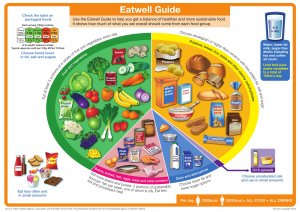It’s important for you and your baby that you have a well-balanced diet during your pregnancy.
Why there's no need to eat for two
It’s only in the last three months that you need to eat just a little bit more, but only around 200kcal extra, as your energy needs will increase during this time. It’s good if that little bit extra comes from food high in protein, calcium or iron.
You may be more likely to become low in iron while you are pregnant, so it’s good to choose plenty of iron rich foods like red meat, pulses, wholegrain starchy food and fortified cereals, green leafy veg and dried fruit. It’s also good to drink a small glass of fruit juice while eating foods rich in iron as it helps your body absorb the iron. Avoid drinking tea and coffee at mealtimes as it has the opposite effect and makes it harder for the body to absorb the iron.
Your appetite will change when you’re pregnant, so a healthy breakfast every day can help you avoid snacking later on in the day on foods that are high in fat and sugar.
The NHS has a food scanner app that you can use to find healthy food alternatives.
Tips for a varied diet
Eating healthily often means just changing the amounts of different foods you eat so that your diet is varied, you don’t have to cut out all your favourites. It’s good to choose a diet based on the eatwell guide.

Choose something from each food group and this will make sure that you have a healthy balanced diet. You don’t need to do this for every meal, but try to get the balance right during the week.
Fruit and vegetables
- Fresh, frozen, tinned, dried or a small glass of juice – aim for at least 5 portions each day. What’s in a portion? Well a portion is roughly what will fit in the palm of your hand.
- Fruit and veg provide vitamins and minerals along with fibre which can help digestion and prevent constipation.
Starchy foods
- Potatoes, bread, rice and pasta are great starchy food choices at each mealtime and as snacks. Try and choose wholegrain and higher fibre varieties. These are the foods which give you energy, with some vitamins and fibre helping to fill you up.
Protein foods
- Pulses such as beans, peas and lentils, fish (including oily fish such as salmon, mackerel and pilchards), eggs and meat are great protein rich food options
- There are some fish you should avoid in pregnancy, as explained on the NHS website.
Dairy foods and alternatives
- Milk, cheese and yoghurt all contain calcium which is important for developing healthy bones and teeth. Try to choose the lower fat varieties such as semi-skimmed milk, low fat yoghurts and reduced fat cheese which all still contain the same amount of calcium but not as much fat. If you choose a dairy alternative to milk and yoghurt, it is important to choose the calcium fortified unsweetened varieties.
- There are some cheeses you should avoid in pregnancy, as explained on the NHS website.
Oils and spreads
- Some fat in the diet is important to ensure we get essential fat soluble vitamins, but we need to make sure we eat the correct type of fats and only use a small amount. Unsaturated oils such as rapeseed, olive or sunflower oils are healthier choices than saturated fats like butter, ghee and lard. Swapping butter for a lower fat spread reduces your saturated fat intake.
Foods to eat less often and in small amounts
- Food and drinks high in fat and sugar such as cakes, biscuits, chocolate, sweets, puddings, pastries, ice cream, jam, honey, crisps, sauces, butter, cream and mayonnaise.
Why should you avoid some foods during pregnancy?
There are some foods you should avoid eating during pregnancy because they could affect your or your unborn baby’s health. The NHS website has further information available.
Alcohol
Experts still can’t agree on exactly how much alcohol – if any – is completely safe for you to have while you’re pregnant, so the safest approach is not to drink at all while you’re expecting. The NHS website has more information on alcohol intake whilst pregnant.
Supplements
Eating a healthy, varied diet will help you to get most of the vitamins and minerals you need. But when you are pregnant you will need to take a folic acid supplement. It’s recommended that you take:
- 400 micrograms (mcg) of folic acid each day – you should take this from before you are pregnant until you are 12 weeks pregnant
The Department of Health also advises you to consider taking a vitamin D supplement containing:
- 10mcg of Vitamin D. Vitamin D regulates the amount of calcium and phosphate in the body, which is needed to keep bones, teeth and muscles healthy.
Some parents are eligible for free vitamins via NHS Healthy Start, find out more here.
Weight gain during pregnancy
Most women can put on between 10 – 12.5kg (22 – 28lb) in weight over the whole pregnancy, putting on most of the weight after week 20. Much of the extra weight is due to your baby growing, but your body will also be storing fat, ready to make breast milk after your baby is born.
Putting on too much or too little weight can lead to health problems for you or your unborn baby. If you’re concerned about your weight or any other aspect of your health while pregnant, ask your midwife or GP for advice.
Find out more about weight gain during pregnancy on the NHS website.


